Recycling in NI: What does the future look like?
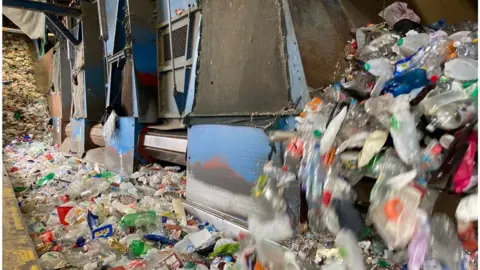 BBC
BBCWhen you take out the recycling you probably never think about where it goes.
Some of the plastics are helping to drain Premier League football grounds for big clubs like Chelsea, Aston Villa and Crystal Palace.
Lurgan-based company Cherry Pipes have supplied those stadia, and other big infrastructure projects.
Their pipes are made from shampoo, washing-up liquid bottles and milk cartons collected from households.
We've done well at recycling - half our waste is dealt with that way.
And it is helping to sustain jobs in Northern Ireland.
Recycling adds at least £110m a year to the local economy and employs 700 people.
But we could, and will be asked, to do more.
'Come a long way'
Tough new targets are coming which will require 65% of our waste to be recycled by 2035.
Landfill will be reduced to 10% of the waste we produce.
The executive is consulting on ideas on how to meet those targets.
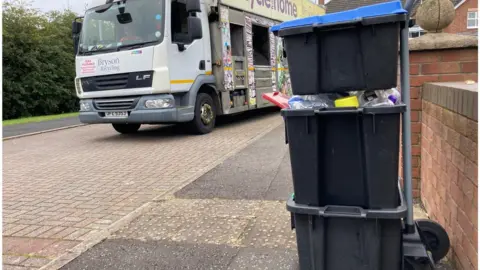
Making businesses separate waste for collection in much the same way as householders already do, is one idea.
Another option is to reduce the size of domestic black bins to encourage even greater use of the recycling ones.
Bryson Recycling collects glass, paper, cans and plastics for five councils.
Director Eric Randall said Northern Ireland had come a long way - moving from 5% recycling to 50% in 20 years.
About a quarter of that goes to a number of local companies, like Cherry Pipes, to make new products, the rest is exported.
He says the best way to keep that waste resource and it's value in Northern Ireland is to collect it as separate waste streams, not all mixed up in the same recycling bin.
"The opportunity for supporting jobs locally is massively enhanced if we can ensure that this material stays locally."
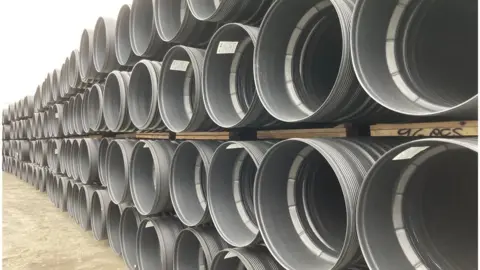
At Cherry Pipes, sales director Fintan Monaghan, says the company is expanding and needs more raw material.
This year they've processed 10,000 tonnes of recycled plastic.
He says quality is generally good, but there needs to be a focus on consistency.
Coordinating what's collected in which bin across all councils would help end public confusion.
"If you live in Coleraine and you move to Enniskillen, you could have a different type of bin and a different material that you put into it," he said.
"We should have a joined-up approach right across and the benefit for us would be consistency of what we receive."
'Bin to bulb'
About one million tonnes of waste is collected by councils in Northern Ireland annually.
About 50% of it is recycled, 29% is landfilled and about 20% goes to what's called energy recovery.
There's only one such Energy from Waste plant in Northern Ireland and it has just been opened.
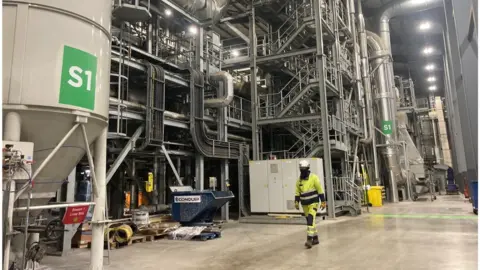
The £107m Full Circle Generation Plant in Belfast docks, generates enough electricity for 12,000 homes.
A third of it goes to the adjacent Bombardier plant, two-thirds is fed to the grid.
Black bin waste collected by a sister company RiverRidge is sorted off site.
The recyclables are removed and the rest is shredded and lots of it trucked to the docks where it's baked at high temperature to release gases which are fired to generate electricity.
They call it "bin to bulb".
The chief executive of RiverRidge, Brett Ross, says this thermal treatment facility will help Northern Ireland move away from landfill, but it's not a forever fix.
"This is infinitely better than landfill so it's a necessity to have this right now so we can avoid landfill. Do I think we'll need this facility in 50 years? I don't think so because we'll all have moved on."
What he means is that we will be producing less waste and recycling more of it.
On one level that creates a problem for Full Circle Generation.
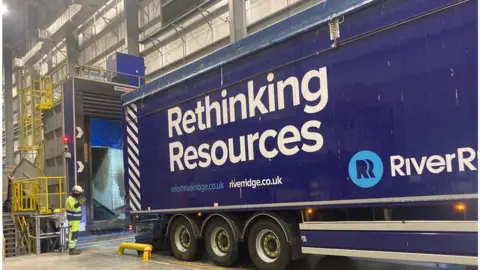
If the current recycling rates are maintained by 2025, Mr Ross says, there may not be enough black bin waste to run his plant as he does now.
He would either have to look for other waste streams, or up the amount of plastic in the fuel, increasing it's calorific value and allowing him to generate the same amount of energy using less of it.
He says his companies can deal with 80% of Northern Ireland's black bin waste.
That raises another issue - the necessity of the planned £240m ARC21 waste incinerator at Mallusk currently going through planning.
Do we need a second plant to treat what looks like being a diminishing amount of black bin waste?
Arc21 says there's enough waste for both as landfill capacity is squeezed; that it will be a publicly owned asset rather a private enterprise and that it will mean competition in the waste marketplace and so provide value for money for council ratepayers.
